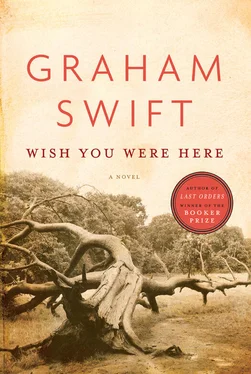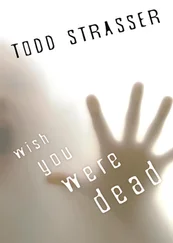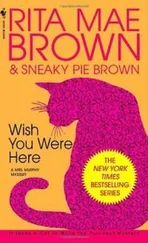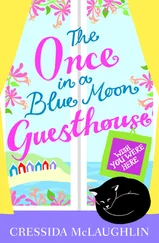Michael had removed his cap as well, as if out of respect for something. He would have pressed the back of his head, too, against the trunk and its slight inward slope. This might have been mechanically necessary, but Jack had no doubt either, though he didn’t say it (wasn’t it plain — why had Michael gone to this spot at all?), that this was out of the same dominant motive. His father had simply wanted to press his head, his skull and his back hard against that oak tree and feel it pushing back. Spine against spine.
Jack knew — he knew it from climbing up the track in winter to get the school bus — that when you shine a torch at night it lights your way but makes the surrounding darkness several times darker. When he arrived beneath the tree he partly wished he hadn’t brought a torch. It made the scene look like something horribly staged just to be lit up and it made everything else, despite the moonlight, pitch-black. Though Jack was technically prepared for what he would find, this had not made the discovery any less shocking, and how to describe what he’d felt at this moment was beyond him. Though he’d walked downhill — perhaps it was more of a scramble — he was panting for breath and his heart was banging inside him. Perhaps it was because of this that he’d reached out to feel for his father’s heart, as if while one heart was beating so violently another could surely not be lifeless. To touch his father’s breast certainly made more sense, in any case, than to touch any part of what was left of his head.
Thus he’d felt the small, hard object in his father’s shirt pocket and known exactly what it was. He didn’t dare remove it. Why should he have removed it? He was overcome by conflicting instincts, to touch and not to touch. In its recoil, the gun had jumped from between his father’s lips and from his fingers so that its double barrel lay now aimed at his waist. Even before stooping to feel his father’s chest, Jack had automatically removed the gun, as if Michael was still in danger.
This was all wrong perhaps, he should have touched nothing, but it was what he did. He hadn’t known if his father had loaded — or used — both barrels or if there was still a cartridge in place. He didn’t know if he should have broken open the gun to check. Or indeed if he should have carried the gun back with him to the safety (though that was a strange idea) of the farmhouse. Normal procedure had been suspended. You didn’t ordinarily leave a gun, especially one that might still be loaded, in the middle of a field, even if it was the small hours of the night. You didn’t normally leave your father in a similar position. In any case, he moved the gun from where it had fallen and placed it to one side in a cleft between the roots. Then, after feeling his father’s inert and medalled chest, he just stood — he couldn’t have said for how long — over the body.
He couldn’t have described his feelings at this time, but anger must have been part of them — a very large part of them — since, though this had no place at all in his subsequent relation of events, what he began to say, aloud and more than once in the middle of a dark field to his dead father, was: ‘You bastard. You bastard.’ Even as he shone a torch on his father’s shattered features: ‘You bastard.’ He would never remember how many times he said it, he wasn’t counting, but he couldn’t stop saying it. ‘You bastard. You bastard.’
It was the wrong word, perhaps, since it’s not a word you use of your father or of any father, it’s a word that works in the other direction, but he kept saying it, and the more he said it, the more it seemed not just an angry word but a useful, even encouraging word in the circumstances — the sort of word you might use to someone who wasn’t dead but just in a precarious situation, to help them pull through it. ‘You bastard.’ It kept coming to his mouth like a chant or some regular convulsion, like the only word he might ever say again.
He was saying it when, after standing for however long it was, he actually sat down beside his father, his own back against the tree — it was easily broad enough — and wondered if he shouldn’t stay there with him, freezing as it was, at least until dawn, or if he should take the donkey jacket from under him and wrap it round him, or — since that would have its problems — if he shouldn’t take off his own jacket and wrap it round him. ‘You bastard. You bastard.’ He was saying it when he wondered whether to pick up the gun or leave it where it was. He was saying it, at intervals, when after deciding to leave the gun — it seemed to belong there — he made the climb back up the steepening field to the farmhouse, his breath coming like the strokes of a saw through his chest: ‘You bastard.’ He was saying it as the farmhouse and the lights he’d left on rose monstrously over the hump of the field above him, and as he passed by the Small Barn into the yard. By now it had become like some hoarsely uttered password. ‘You bastard.’
He continued to say it during the period between regaining the farmhouse and making the call he knew he would have to make, when he had no clear sense of the passage of time and when he continually wavered between the thought of making the call, which would make things final and definite, and the thought that he should go back down to the oak tree, because what had happened perhaps might not really have happened at all. Or because he should just be there with his father. Up here, in the farmhouse, he’d already deserted him. ‘You bastard.’
He said it as he wondered whether he should wash off the muck that had got on his hands or whether he should leave it there for all of time to erase or ingrain. ‘You bastard.’ And he’d got so rhythmically used to saying it, that when he finally made the call and was able to get out that other word, ‘Police’, it’s not inconceivable that he might have said, ‘You bastard,’ too, into the phone.
He didn’t mention his repeated utterance of this phrase to Bob Ireton and his senior companion (or to anyone else), nor did he mention that during the preceding day and evening, following the Remembrance Day gathering, he had also uttered the phrase, if not aloud, but inside himself or perhaps under his breath. But the fact that he’d vented it, one way or the other, so much beforehand somehow enabled Jack to regain a degree of composure — it was his strange way, even, of haranguing himself — and to give the detailed and relatively focussed account of events that he gave. All of which, together with the actual evidence lying there in Barton Field, added up to the overwhelming conclusion, to be endorsed by the inquest, that Michael Luxton had taken his own life.
Neither policeman felt it was his place to comment on the strangenesses, so far as they knew them, of Jack’s behaviour — who wouldn’t behave strangely? — or on his technically inappropriate actions. He shouldn’t have touched the body or even have moved the gun. But this was his own father lying there. Jack was hardly some meddling third party. The poor man had done what he did and could — when, quite possibly, he might have slept through the whole incident. And he was plainly mortified by the fact that, had he been awake just a little earlier, he might have prevented all of it from happening.
One didn’t have to search far for a motive. Michael Luxton was like others. The peculiar circumstances of Remembrance Day seemed tragically to have precipitated something. Michael had either gone to bed with the not quite complete intention of acting, or he’d woken in the dead of night to form that soon-executed intention.
Detective Sergeant Hunt gave permission for the body to be moved by the ambulance men. It was a laborious and upsetting job transporting it up the steep field. The gun and Michael’s donkey jacket and cap were taken separately as evidence, to be returned later. Likewise everything in Michael’s pockets, including the medal.
Читать дальше








![Питер Джеймс - Wish You Were Dead [story]](/books/430350/piter-dzhejms-wish-you-were-dead-story-thumb.webp)



